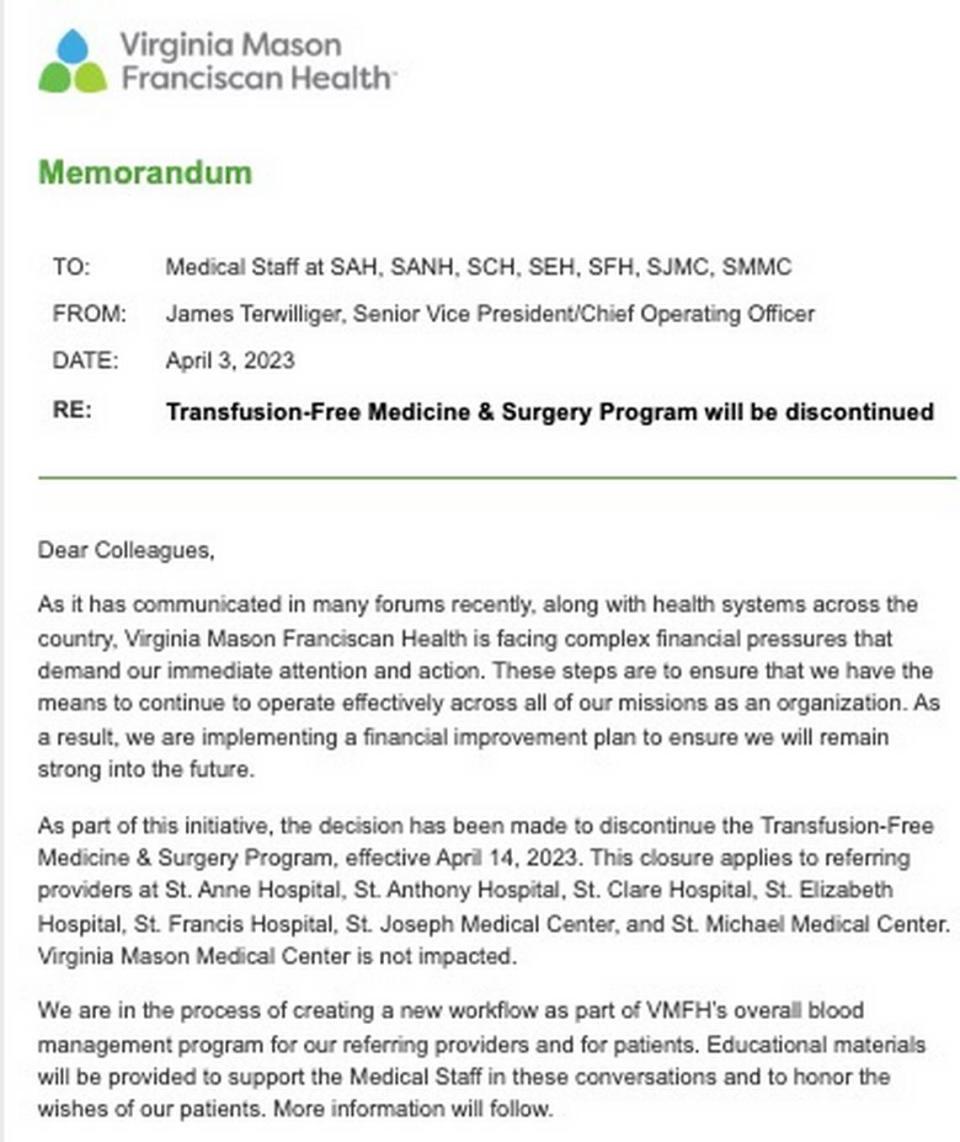Financial pressures put squeeze on another program at Tacoma’s St. Joseph Medical Center
More changes have been made at St. Joseph Medical Center in Tacoma, along with other hospitals in its network. This time the changes affect a transfusion-free medicine and surgery program.
Last week, The News Tribune reported on St. Joe’s ending a contract with Pacific Anesthesia after the group’s employee ranks grew too thin to maintain the staffing terms.
The group of anesthesia doctors was set to hit a low of 12 doctors from more than 30 just a few years ago, according to health care sources speaking to The News Tribune.
On April 3, a memo was sent to staff at seven Virginia Mason Franciscan Health hospitals in the area, including St. Joseph, notifying them of a decision “to discontinue the Transfusion-Free Medicine & Surgery Program, effective April 14, 2023.”
The memo was shared with The News Tribune this week by a medical professional affiliated with St. Joseph, and the information was confirmed on Friday by VMFH.

The April 3 memo stated, “This closure applies to referring providers at St. Anne Hospital, St. Anthony Hospital, St. Clare Hospital, St. Elizabeth Hospital, St. Francis Hospital, St. Joseph Medical Center, and St. Michael Medical Center.”
It added, “Virginia Mason Medical Center is not impacted.” It also noted the network was creating “a new workflow as part of VMFH’s overall blood management program for our referring providers and for patients.”
James G. Terwilliger is senior vice president/chief operating officer at Virginia Mason Franciscan Health and was shown as the author of the April 3 memo.
In an emailed statement Friday in response to questions, Terwilliger told The News Tribune, “As part of our continued efforts to ensure that we have the financial means to continue to operate effectively, we’ve made the difficult decision to discontinue the transfusion-free medicine and surgery program.”
He added, “Our Blood Management Program will continue to support our providers and staff to ensure we provide appropriate care for all of our patients. We are also working with local community organizations to communicate this transition.”
VMFH told The News Tribune that the program “offered community and educational programs for populations who chose not to or cannot receive transfusions.”
It added, “Patients will still have the opportunity to opt out of transfusions and receive alternate treatments in accordance with their medical needs or personal beliefs.”
Additionally, the system noted it still had “physicians and providers who are trained in bloodless medicine practices who will continue to support these efforts moving forward.”
Who uses transfusion free medicine
Transfusion-free medicine programs are touted by many hospitals nationwide.
According to an online FAQ by the University of Southern California, the option “utilizes specific treatments, devices, techniques and equipment in order to accommodate the healthcare needs of individuals who choose not to receive blood or blood products.”
With advances in equipment and technology, “doctors are able to successfully perform a multitude of procedures, ranging from routine tonsillectomies to complex orthopedic and open heart surgeries, without the use of blood transfusions,” it added.
VMFH did not offer details on how many patients/staff would be affected, but another local health system’s numbers offer insight into its own program.
Tacoma-based MultiCare’s transfusion-free program has more than 6,250 patients participating, according to Scott Thompson, MultiCare media representative, in response to questions about the program.
“The program consults with about 1,500 patients annually who receive care at MultiCare facilities,” he said via email. The program is staffed by three program advocates, Thompson added, part of a “larger six-person Patient Blood Management program team.”
The network’s online description says, “Patients may be interested in transfusion free medicine and surgery for many reasons, including religious beliefs or a preference to not use donor blood due to the risk of blood-borne illnesses.”
MultiCare’s program started in 2005 at its Good Samaritan Hospital in Puyallup “and has since expanded to all our facilities in the Puget Sound,” Thompson added.

